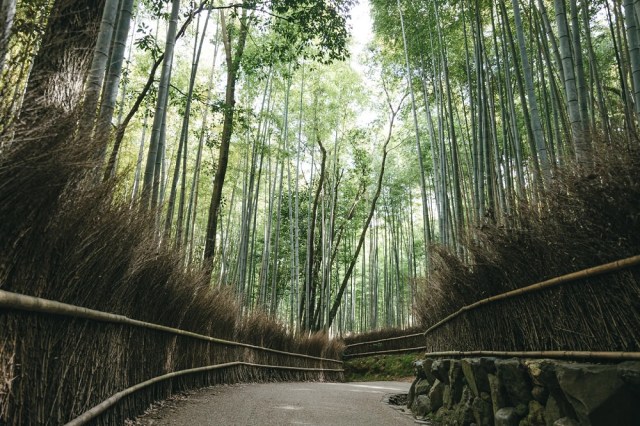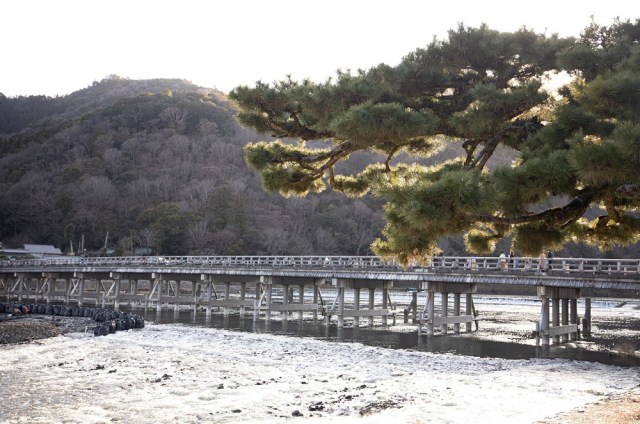
But an increase alone isn’t likely to completely solve the problem.
From its picturesque riverside area and iconic bamboo forest to art galleries and garden restaurants, there’s a lot to see in Kyoto’s Arashiyama neighborhood. One thing you won’t see very much of there, though, is public trash cans.
That’s not an entirely unique situation. Travelers to Japan often remark on how few and far between trash cans are, even in heavily touristed areas. However, the Arashiyama Hoshokai, a local promotion and preservation organization whose members include local merchants, says it wants more trash cans installed to help combat a rise in littering.
Trash cans used to be more plentiful in Arashiyama, but that didn’t always translate into clean streets. In the video below, some of the neighborhood’s previous city-installed streetside garbage receptacles can be seen. The cans are overflowing, with domes of trash sticking up above the rim formed by people continuing to pile up garbage even after the cans are at capacity. Because the piles aren’t very steady, they’d eventually topple or get blown over by the wind, causing trash to spill onto the sidewalk and into the street.
Because of this, says Kazuma Tadano from the Kyoto municipal government’s Town Beautification Promotion Division, Arashiyama locals requested that many trash cans be removed from the area, with the intended hoped-for effect of communicating to tourists that they were expected to take any trash they might generate back to their hotel or home.
However, with Arashiyama on its way back to the 8 million visitors it received annually prior to the pandemic, the issue of how to handle trash is once again demanding attention. Even if most visitors are conscientious about hanging on to their trash until they can find a place to properly dispose of it, with so many visitors coming to the neighborhood, even a small percentage of them littering/precariously piling trash means a lot of garbage on the ground. It’s getting to be an especially big problem now that the summer travel season is here. At the point in the video cued below, the same bank of trash cans in Arashiyama’s bamboo groove is shown at 9 a.m. on the left, and at 3 p.m. the same day on the right, with the containers completely full and trash on the ground in front of them in the afternoon.
With scenes like this becoming increasingly common, Junji Makino, head of Arashiyama Hoshokai, says “In the end, we really do need public trash cans,” and “To start with, we’d like [the city government] to reinstall trash cans in the places where we previously had them.”
Makino acknowledges that the presence of trash cans can lead to more trash on the streets, as people try to stack or cram items on/in to a can that’s already full. He makes special mention of half-eaten snacks from streetside vendors, and in the video you can see visitors eating ice cream, pickles, and other refreshing treats. Still, the current small number of trash cans simply isn’t enough, and increasing their number will help lessen the amount of trash on the street, Makino and Arashiyama Hoshokai feel.

“Lessen” is an important distinction to make here, though, as even with more trash cans, it’s probably not going to be unusual to find many that are already full. Part of what makes Arashiyama so appealing to visitors is that it’s one of the less developed parts of Kyoto, but preserving that charming old-school atmosphere likely means that the city would be reluctant to have large fleets of noisy garbage trucks driving around the neighborhood’s narrow streets to make multiple trash pickups every day, to say nothing of the additional budget burden. So keping Arashiyama clean is probably going to take extra efforts on both sides: more trash cans from the city government, and tourists also being prepared and committed to take what trash they can back with them.
If you want to help do your part as a visitor, there are two simple things you can do. Should you happen to buy food or a drink from a street vendor, if you enjoy it nearby (as opposed to walking far away while eating/drinking it), you can usually ask the vendor to throw the plate/bowl/skewer/cup/etc. way for you with the phrase “Kore wo sutete moraemasu ka?” (“Can you throw this away for me?”). The other thing to do is in the morning, before leaving your hotel and coming to Arashiyama, make sure you’ve got a plastic bag or two inside your backpack/shoulder bag/purse. That way if you do have trash but can’t find a sufficiently empty trash can, you can stick it in the bad and take it back with you, and help leave Arashiyama looking as beautiful when you leave as it did when you arrived.
Source: YouTube/FNNプライムオンライン
Top image: Pakutaso
Insert images: Pakutaso
● Want to hear about SoraNews24’s latest articles as soon as they’re published? Follow us on Facebook and Twitter!

No hay comentarios:
Publicar un comentario